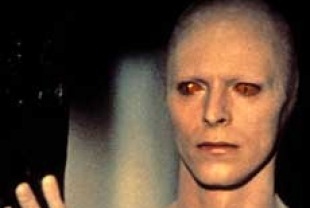A strange creature from another planet falls to earth. His arrival is seen by a mysterious observer. Is the witness a CIA agent, a scientist, a psychic, or a believer in extraterrestrial beings? As we in the audience view this solitary alien on the rim of a hill, he summons up our fears about the unknown. Where did he come from? Why is he here? Is he friend or foe? What will he do?
The Man Who Fell To Earth is a science fiction mystery story composed of an intriguing web of images. The non-human shadow that Thomas James Newton (David Bowie) casts stimulates us to understand ourselves and our world from another perspective. The screenwriter, Paul Mayersberg, puts it this way: "In The Man Who Fell To Earth, the mystery is not merely a matter of 'more' but different, almost inconceivable, and impossible to guess. The mere assertion that there is another world somewhere else, different from ours, calls each of our worldly notions into question."
Newton is tall and skinny, wide-eyed, and white as an albino. He is immediately taken up with one of Earth's most precious resources: water. His wife and two children thirst on the desolate planet of Anthea, millions of miles away. The visitor is on a mission: to make enough money for the creation of a space vehicle so that he can return home and save his people.
Newton travels to New York City and offers an incredible proposition to Oliver Farnsworth (Buck Henry), a patents lawyer. He wants him to take charge of World Enterprises, a new corporation specializing in electronics. The money for the business venture comes from nine patents Newton has dreamed up, including one for self-developing film.
The alien, who treasures privacy and does not appreciate urban life, retreats to a small town in New Mexico. There he meets Betty Jo (Candy Clark), a maid in a hotel. She becomes his lover, nurse, and housekeeper. Nathan Bryce (Rip Torn), a chemist teaching at a university, is hired to work on a fuel carrying system for the spaceship. He suspects that Newton is from another world.
It turns out that Newton has learned about humans through television signals he picked up on his planet where the understanding of electronics is highly sophisticated. While sequestered away in his cabin with Betty Jo, the visitor watches twelve sets at a time. Playing before him is a multileveled montage of our civilization as reflected in old movies, situation comedies, news reports, and commercials.
In many sci-fi works, whenever extraterrestrial beings are encountered, they almost always are mistrusted. The other worlders are physically deviant from earthly "norms" and portrayed as having superhuman intelligence or strength. We have to wonder why we always portray "other" people as the personification of evil. Why do we automatically assume that if "they" are out there, they are to be feared? It is probably part of our Earth Chauvinism. We against Them. Of course, it is also our pride. We refuse to admit that other worlders may be better than us — morally, mentally, or physically.
Newton's appearance without his creature earlobes, nipples, eyebrows, contact lenses, and wig is quite strange. This "otherness" terrifies Betty Jo and eventually convinces Bryce to betray him. The alien is picked up and taken away for observation by the government. His crime: he has "overstimulated the economy" with his World Enterprises and the creation of his spacecraft. The real reason: scientists want to examine this bizarre biological specimen. The man who fell to earth will never go home again.
Director Nicholas Roeg has a keen cinematic sense (Performance [1970], Walkabout [1971], Don't Look Now [1973] ). In this film, he effectively uses a crosscutting and oblique style to create a visually stunning work of art. David Bowie (the rock star) is especially good as the eerie and vulnerable Newton. The Man Who Fell To Earth is mentally stimulating, adventuresome, and imaginative.
DVD features include Audio Commentary with director Nicolas Roeg and actors David Bowie and Buck Henry, and interviews with costume designer May Routh, production designer Brian Eatwell Production, and screenwriter Paul Mayersbert.
